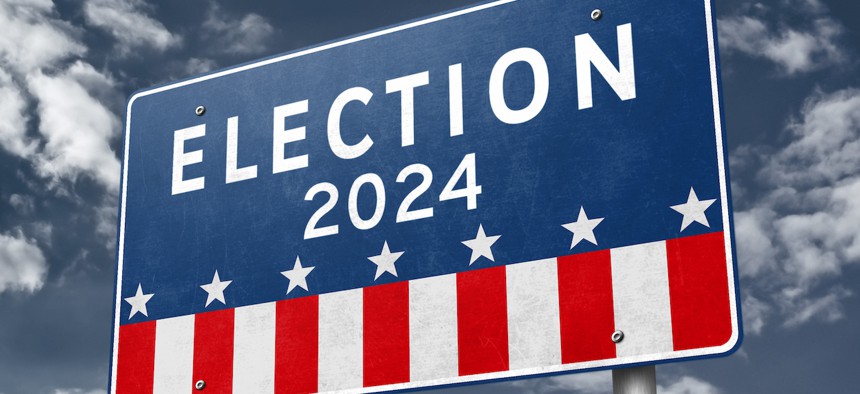
gguy44/Getty Images
Will an attack on federal employees swing the election? Probably no
COMMENTARY | A closer look at what a recent series of focus groups revealed.
As the 2024 campaign has gotten rolling, a very long time before the election, there’s been an unbroken drumbeat of criticism of the “deep state” and the “unaccountability” of federal employees.
It turns out that the “deep state” gets a lot of traction among Republican voters in the swing states of Arizona and Georgia. Donald Trump lost these two states by a total of just 22,000 votes. Are Trump Republicans ready to hang with him in 2024?
In September, Democracy Corps conducted a series of focus groups in the two states. The research organization gathered four different factions of the GOP—Trump loyalists, evangelical Trump loyalists, Cheney conservatives, and Moderate Republicans. When asked about how they felt about the future of the country, they weren’t a very sanguine bunch. Words like “worried,” “concerned,” “uncertain,” and “bleak” rose to the top.
They’re especially concerned about the Constitution, which a Trump loyalist in Arizona said is “dangling by a thread” and another said is “hijacked.” An evangelical Trumper in Georgia said she thought the Constitution is “under attack.”
But it’s not criticism of federal employees that’s driving their worries. It’s prices that they view as out of control, instability at the border, the cost of the Ukraine war, and “woke” policies that they think are being forced on their kids.
When it comes to the “deep state,” a Georgia woman who’s a Trump loyalist saw a “conspiracy.” A Georgia woman who’s an evangelical Trump loyalist called it “a wolf in sheep’s clothing. Hiding right in front of our faces.” People just don’t see it because “no one cares about it. It is outside people’s everyday lives. It makes them unaccountable.”
And a Trump loyalist in Arizona said “there is a Deep State.” And, he said, there were “Marxists. Protecting their own interests.” In fact, “I believe there is a small group of people controlling world finances.”
In digging into the focus group’s views, however, sentiment was decidedly mixed. A Trump loyalist in Arizona said he would never hire federal employees in the private sector. Another Trump loyalist there said, “They don’t have a good work ethic.” Yet another: “overpaid and underqualified. Not trustworthy.” A Trump loyalist added that he believed “if you have a job for the federal government, you have a job for life. I don’t think they care about what is going on.”
Evangelical Trump loyalists in Georgia were more pointed in their views. One said she thought federal employees were “overpaid,” while another said “some of them aren’t very good.” Yet another woman added, “They seem irritated to help you.” For one Evangelical Trumper, the opinion was simple: “entitled and lazy.”
In general, however, the participants in the focus groups weren’t stirred by Trump’s promise to clean out federal employees if he’s elected. Focus group members were most concerned by their conclusion that there were just too many bureaucrats and that too many of them were lazy. On the other hand, there wasn’t general concern that federal employees were pursuing their own agenda, a core tenet of the deep state argument.
These are fascinating findings, in several respects.
First, the “deep state” critique doesn’t get a lot of traction, even among Trump supporters. From the first week of Trump’s first term, the “deep state” argument has been a steady criticism by Trump forces of the federal government, but it’s not getting far.
That certainly doesn’t mean that conservatives aren’t quietly framing an agenda around unwinding what they view as the “deep state.” That campaign, however, isn’t catching fire among even Trump’s most loyal supporters.
Second, there’s strong support for the proposition that there are just too many federal employees. However, since the mid-1970s, public opinion polls have regularly shown that Americans would rather have a smaller government and fewer services. Support for that proposition has been rising among Republicans; it’s falling among Democrats.
But when asked about which programs they’d like to cut, from education to foreign aid, there wasn’t a plurality of support for reducing spending in any of 13 different policy areas. In half of the areas, in fact, including education, veterans benefits, infrastructure, and health care, more than half of those surveyed wanted to spend even more.
Moreover, underlying the eternal debate about cutting government employees is the disconnect of that debate from the government’s mission. I dug into which federal agencies employ the most people, and it turns out that the 15 largest agencies, by employment, account for nearly 80% of all federal employees. With the exception of the IRS and the FBI, they perform functions that no one wants to cut—support for the military, Customs and Border Protection, Social Security Administration, the FAA and TSA, FEMA, federal prisons.
There’s support from Vivek Ramaswamy and some House Republicans to defund the FBI, but no one really wants to weaken the American defense against organized crime, drug cartels, or homeland security threats. And the IRS is an agency that only the U.S. Treasury truly loves, but no government in the history of the world has ever existed long without an agency to collect taxes. And no tax collection agency has ever been popular.
Third, it’s clear that many federal employees have a black eye when it comes to dealing with the people. That’s supremely ironic, because most Americans never really encounter a federal employee except when traveling through airports or violating the law. Even in the biggest entitlement programs—Social Security and Medicare—most recipients never see or talk with a fed. Banks process Social Security payments and seniors get Medicare-paid health care through their own non-governmental providers, clinics, and hospitals.
There’s a powerful case for federal employees to pay much more attention to customer service. That’s why it’s a key part of the President’s Management Agenda. But the manifest problems in government’s connections with the people are why rankings of customer experience regularly put the federal government at the very bottom of more than a dozen industries. This is certainly something the government needs to work on.
But when it comes to mobilizing worries about the “deep state” to fuel the Republican presidential campaign, as Democracy Corps found, there’s little evidence that will work.







